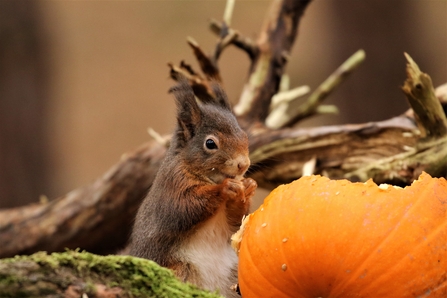
Red squirrel enjoying a discarded pumpkin. Image by Andy Hankinson.

Red squirrel enjoying a discarded pumpkin. Image by Andy Hankinson.
With Halloween spending in the UK projected to reach over £1billion in 2023 and Brits spending £28.95 million on pumpkins for Halloween in 2022 (according to finder.com) that’s a lot of pumpkins to be disposed of.
As with previous years, the Trust is asking people to consider wildlife when disposing of their pumpkin lanterns.
All too often pumpkins are put on the ground in gardens, parks and green spaces by the public for animals to eat, and, although not particularly harmful to birds, they are very dangerous to hedgehogs.
Pumpkins are a natural laxative, which, if eaten by hedgehogs will cause serious diarrhoea and dehydration - especially dangerous at this time of year when it is vital that hedgehogs put on as much weight as possible to give them the best chance of surviving the winter and hibernation.
In addition, discarded pumpkins can attract rats, smother wild plants and grasses and build up nutrients in the top soil that can lead to the growth of invasive plants which, in turn, can take over the ground.
As an alternative to leaving them on the ground, the wildlife charity suggests composting them or burying them in a hole at least 12 - 18 inches deep to divert organic waste from landfill, make pumpkin bread, muffins or soup or, better still, roast them and turn into pumpkin seed snacks for bird feeders.
Sara Frisby, Conservation Officer with Northumberland Wildlife Trust says:
“As a conservation organisation we are always encouraging people to look after hedgehogs especially in the winter, so it’s great that people think they’re helping them by leaving their old pumpkins outside, however, unfortunately, it’s the wrong type of food for them. They may enjoy it, it may be the equivalent of gourmet dining, but it will make them very poorly, so please don’t do it.
“If you want to help wildlife, dry the seeds and put them in your bird feeders to keep them fuelled over the winter months.”